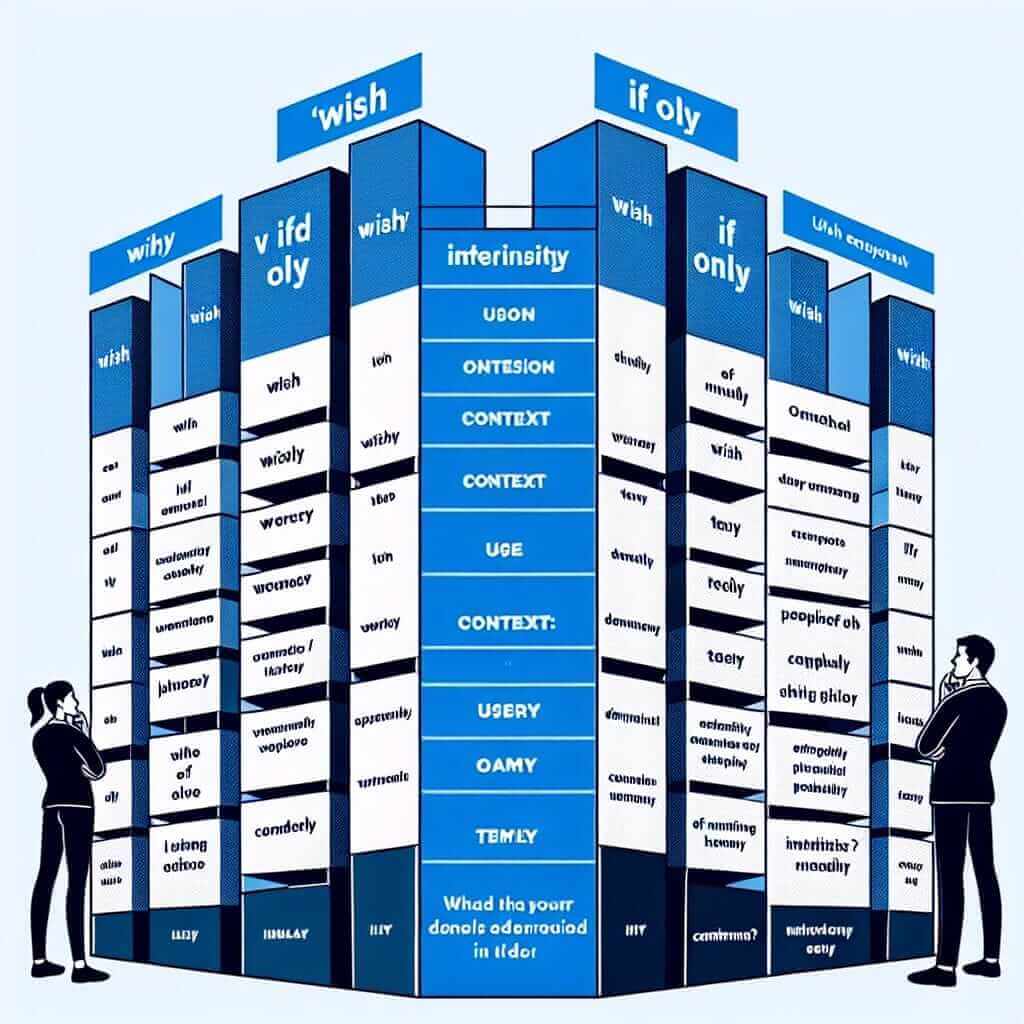“Wish” and “if only” are two common expressions used to convey regret or a longing for something different. Mastering their usage is essential for achieving a higher band score in the IELTS Speaking test, particularly when discussing past experiences or hypothetical situations.
Here are some examples of how “wish” and “if only” can be used in the IELTS Speaking test:
- Part 1: “Do you ever wish you had more free time?”
- Part 2: “Describe a time you had to make a difficult decision. What happened? What did you choose? Do you wish you had chosen differently?”
- Part 3: “Some people believe that it’s important to always look ahead and not dwell on the past. Do you agree or disagree?”
Let’s analyze one example:
“Describe a time you had to make a difficult decision. What happened? What did you choose? Do you wish you had chosen differently?“
In this case, the candidate can use “wish” to express regret about their past decision. For instance:
“I wish I had chosen to study abroad when I had the chance. At the time, I was too afraid to leave my family and friends, but now I realize it would have been an incredible experience.”
This response effectively conveys regret while demonstrating a good grasp of grammar and vocabulary.
Understanding Regret: “Wish” vs. “If Only”
While both “wish” and “if only” communicate regret, their intensity and usage differ.
- Wish: Implies a desire for something to be different but acknowledges that it’s unlikely or impossible to change.
- If only: Expresses a stronger sense of longing, often accompanied by a feeling of helplessness or frustration about the unchangeable past.

Mastering the Grammar: Structures and Tenses
Understanding the correct tense to use with “wish” and “if only” is crucial for achieving grammatical accuracy in your IELTS responses.
1. Wishing for a Different Present:
Structure: Wish/If only + Past Simple
This structure expresses a desire for a different reality in the present.
Examples:
- I wish I had more free time. (The reality is I don’t have much free time).
- If only I spoke another language fluently. (But I don’t.)
Analysis: Notice how the Past Simple tense is used after “wish/if only” even though the sentence refers to the present.
IELTS Application:
- Speaking Part 1: “Do you enjoy your job?”
- “Yes, but I wish it paid a bit more.” (Implying the current salary is not ideal)
2. Regretting the Past:
Structure: Wish/If only + Past Perfect
This structure expresses regret about something that happened or didn’t happen in the past.
Examples:
- I wish I had studied harder for the exam. (But I didn’t, and now I regret it.)
- If only I hadn’t eaten that last slice of pizza! (I did eat it, and now I regret it.)
Analysis: Past Perfect is used after “wish/if only” to indicate a past action we regret.
IELTS Application:
- Speaking Part 2: “Describe a time you missed an opportunity.”
- “I was offered an exciting job overseas, but I declined because of family commitments. Now, I wish I had taken the opportunity.”
3. Expressing Dissatisfaction with Someone’s Behaviour:
Structure: Wish/If only + would + base form of verb
This structure is used to express a desire for someone to change their behavior, often implying frustration or annoyance.
Examples:
- I wish my neighbor would stop playing loud music at night. (But he continues to do so.)
- If only he would pay more attention! (But he doesn’t, and it’s frustrating.)
Analysis: “Would” + base form of the verb emphasizes the desired change in someone’s actions.
IELTS Application:
- Speaking Part 3: “Do you think technology has made our lives better or worse?”
- “Technology has its benefits, but I wish people wouldn’t spend so much time on their phones. It can hinder real-life interactions.”
Writing Samples:
- Part 2 Cue Card: Describe a skill you wish you had learned when you were younger.
- “Growing up, I was always fascinated by music, but I never learned to play an instrument. Now, I wish I had taken piano lessons. If only I had dedicated more time to it then, I might be able to play my favorite melodies today.”
Common Mistakes and How to Avoid Them:
- Incorrect Tense: Using the wrong tense is a common mistake. Remember the structures and practice them.
- Incorrect: I wish I know how to swim.
- Correct: I wish I knew how to swim.
- Overusing “Wish” and “If Only”: While useful, don’t overuse these expressions. Vary your language for a more natural flow.
Conclusion:
Mastering “wish” and “if only” can significantly enhance your ability to express regret and hypothetical situations effectively in the IELTS Speaking test. By understanding the subtle differences in meaning and using the correct grammatical structures, you can add depth and nuance to your responses, ultimately contributing to a higher band score. Remember to practice using these expressions in various contexts, and soon, you’ll be able to express regret and hypothetical situations with fluency and accuracy.